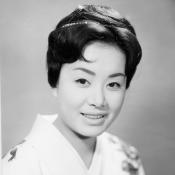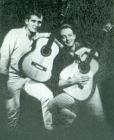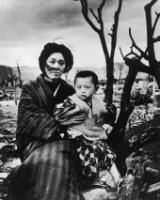あなたに 聞いてもらいたい
あなたに 読んでもらいたい
あなたに 歌ってもらいたい
あなたに 信じてもらいたい
一本の鉛筆があれば
私は あなたへの愛を書く
一本の鉛筆があれば
戦争はいやだと 私は書く
あなたに 愛をおくりたい
あなたに 夢をおくりたい
あなたに 春をおくりたい
あなたに 世界をおくりたい
一枚のザラ紙があれば
私は子どもが欲しいと書く
一枚のザラ紙があれば
あなたを返してと 私は書く
一本の鉛筆があれば
八月六日の朝と書く
一本の鉛筆があれば
人間のいのちと 私は書く
あなたに 読んでもらいたい
あなたに 歌ってもらいたい
あなたに 信じてもらいたい
一本の鉛筆があれば
私は あなたへの愛を書く
一本の鉛筆があれば
戦争はいやだと 私は書く
あなたに 愛をおくりたい
あなたに 夢をおくりたい
あなたに 春をおくりたい
あなたに 世界をおくりたい
一枚のザラ紙があれば
私は子どもが欲しいと書く
一枚のザラ紙があれば
あなたを返してと 私は書く
一本の鉛筆があれば
八月六日の朝と書く
一本の鉛筆があれば
人間のいのちと 私は書く
envoyé par CCG/AWS Staff - 5/3/2009 - 03:43
Langue: japonais
La trascrizione in caratteri latini con l'ausilio di Google Translator
Google Translator helped Romanization
Google Translator helped Romanization
Se ancora la traduzione automatica per mezzo di Google Translator presenta problemi insormontabili, l'ausilio fornito per la traslitterazione è invece abbastanza affidabile e vi ricorriamo volentieri in attesa di migliori strumenti o di trascrizioni effettuate da mano umana. [CCG/AWS Staff]
If automatic translation by Google Translator still shows irresoluble problems, automatic transcription shows an acceptable degree of reliability and we use it with pleasure, waiting for better instruments or transcriptions made by human hand. [AWS/CCG Staff]
If automatic translation by Google Translator still shows irresoluble problems, automatic transcription shows an acceptable degree of reliability and we use it with pleasure, waiting for better instruments or transcriptions made by human hand. [AWS/CCG Staff]
IPPON NO ENPITSU
Anata ni kiite moraitai
Anata ni yonde moraitai
Anata ni utatte moraitai
Anata ni shinjite moraitai
Ippon no enpitsu ga areba
Watashi wa anatahenoai o kaku
Ippon no enpitsu ga areba
Sensō wa iyada to watashi wa kaku
Anata ni ai o okuritai
Anata ni yume o okuritai
Anata ni haru o okuritai
Anata ni sekai o okuritai
Ichi-mai no zaragami ga areba
Watashi wa kodomo ga hoshī to kaku
Ichi-mai no zaragami ga areba
Anata o kaeshite to watashi wa kaku
Ippon no enpitsu ga areba
Hachigatsumuika no asa to kaku
Ippon no enpitsu ga areba
Ningen no inochi to watashi wa kaku
Anata ni kiite moraitai
Anata ni yonde moraitai
Anata ni utatte moraitai
Anata ni shinjite moraitai
Ippon no enpitsu ga areba
Watashi wa anatahenoai o kaku
Ippon no enpitsu ga areba
Sensō wa iyada to watashi wa kaku
Anata ni ai o okuritai
Anata ni yume o okuritai
Anata ni haru o okuritai
Anata ni sekai o okuritai
Ichi-mai no zaragami ga areba
Watashi wa kodomo ga hoshī to kaku
Ichi-mai no zaragami ga areba
Anata o kaeshite to watashi wa kaku
Ippon no enpitsu ga areba
Hachigatsumuika no asa to kaku
Ippon no enpitsu ga areba
Ningen no inochi to watashi wa kaku
envoyé par CCG/AWS Staff - 23/2/2014 - 18:15
Langue: italien
Traduzione italiana (approssimativa).
Non c'è scritto qui "di Riccardo Venturi", anche se "materialmente" l'ho fatta io. Il giapponese non lo so e non ho intenzione di "impararlo in quindici giorni". E', per così dire, una sorta di "traduzione-collage": poiché una traduzione unitaria in rete sembra non esistere, l'ho "assemblata" da vari frammenti (in inglese, ovviamente) reperiti in rete. Naturalmente non so, in questo modo, quanto possa essere esatta; ma, comunque, un'idea dovrebbe darla. Il 6 agosto nominato nel testo è, come tutti dovrebbero sapere, la data in cui fu sganciata su Hiroshima la prima bomba atomica. [RV]
SE AVESSI UNA SOLA MATITA
Vorrei chiedere a voi
Vorrei leggere per voi
Vorrei cantare per voi
Vorrei credere in voi
Se avessi una sola matita
Scriverei “Amore” per voi
Se avessi una sola matita
Scriverei: “Odio la guerra”
Vorrei mandare amore a voi
Vorrei mandare un sogno a voi
Voglio darvi la primavera
La vorrei dare al mondo per voi
Se avessi un pezzo di carta
Scriverei quel che vogliono i bambini
Se avessi un pezzo di carta
Lo scriverei e riscriverei
Se avessi una sola matita
Scriverei della mattina del 6 agosto
Se avessi una sola matita
Scriverei: Vita umana.
Vorrei chiedere a voi
Vorrei leggere per voi
Vorrei cantare per voi
Vorrei credere in voi
Se avessi una sola matita
Scriverei “Amore” per voi
Se avessi una sola matita
Scriverei: “Odio la guerra”
Vorrei mandare amore a voi
Vorrei mandare un sogno a voi
Voglio darvi la primavera
La vorrei dare al mondo per voi
Se avessi un pezzo di carta
Scriverei quel che vogliono i bambini
Se avessi un pezzo di carta
Lo scriverei e riscriverei
Se avessi una sola matita
Scriverei della mattina del 6 agosto
Se avessi una sola matita
Scriverei: Vita umana.
Langue: italien
Traduzione italiana di Carlo Catozzi
Questa è una mia traduzione.
Questa è una canzone giapponese del 1975, presentata al festival della pace di Hiroshima. E' la storia di una donna che si trova ad Hiroshima il 6 Agosto 1945, viene colpita dalla bomba atomica che distrugge la città, e negli attimi prima di morire pensa "Se avessi una matita...."
Questa canzone non è mai stata tradotta in italiano.Su internet esistono solo traduzioni parziali, in inglese,con errori che io ho corretto.
Carlo Catozzi
Questa è una mia traduzione.
Questa è una canzone giapponese del 1975, presentata al festival della pace di Hiroshima. E' la storia di una donna che si trova ad Hiroshima il 6 Agosto 1945, viene colpita dalla bomba atomica che distrugge la città, e negli attimi prima di morire pensa "Se avessi una matita...."
Questa canzone non è mai stata tradotta in italiano.Su internet esistono solo traduzioni parziali, in inglese,con errori che io ho corretto.
Carlo Catozzi
UNA MATITA
Voglio ascoltarti
Voglio leggerti
Voglio cantarti
Voglio crederti
Se avessi una matita
Scriverei che ti amo
Se avessi una matita
Scriverei che odio la guerra
Voglio darti amore
Voglio darti sogni
Voglio darti primavera
Voglio darti il mondo
Se avessi un foglio
Scriverei che voglio dei figli
Se avessi un foglio
Scriverei che ti rivoglio
Se avessi una matita
Scriverei la mattina del 6 Agosto
Se avessi una matita
Scriverei la vita umana
Voglio ascoltarti
Voglio leggerti
Voglio cantarti
Voglio crederti
Se avessi una matita
Scriverei che ti amo
Se avessi una matita
Scriverei che odio la guerra
Voglio darti amore
Voglio darti sogni
Voglio darti primavera
Voglio darti il mondo
Se avessi un foglio
Scriverei che voglio dei figli
Se avessi un foglio
Scriverei che ti rivoglio
Se avessi una matita
Scriverei la mattina del 6 Agosto
Se avessi una matita
Scriverei la vita umana
envoyé par C arlo Catozzi - 10/11/2022 - 14:16
Langue: anglais
English (rough) translation
There's no “by Riccardo Venturi” or by others here, although the translation is my material work. I do not know a single word of Japanese and I didn't plan to “learn it in fifteen days”. It is, so to say, sort of “collage translation”: as it seems there's no complete translation of the song available on line, I have worked it from a number of fragments (in English, of course) I found on the Web. Its reliability may be doubtful, of course; but I think it may give an idea of what the song says. The 6th August mentioned in the song is, as everyone should know, the day the fist H-bomb was launched on Hiroshima. [RV]
IF I HAD ONE PENCIL
I would like to ask you
I would like to read for you
I would like to sing for you
I would like to believe in you
If I had one pencil
I would write “Love” for you
If I had one pencil
I would write “I hate war”
I would like to send you love
I would like to send you a dream
I would like to give you spring
I would like to give it to the world for you
If I had a piece of paper
I would write what the children wish
If I had a piece of paper
I would write and write it again
If I had one pencil
I would write about the morning of 6th August
If I had one pencil
I would write: Human life.
I would like to ask you
I would like to read for you
I would like to sing for you
I would like to believe in you
If I had one pencil
I would write “Love” for you
If I had one pencil
I would write “I hate war”
I would like to send you love
I would like to send you a dream
I would like to give you spring
I would like to give it to the world for you
If I had a piece of paper
I would write what the children wish
If I had a piece of paper
I would write and write it again
If I had one pencil
I would write about the morning of 6th August
If I had one pencil
I would write: Human life.
×
![]()








[1974]
【作詞】松山善三
【作曲】佐藤 勝
Lyrics: Zenzō Matsuyama
Music: Masaru Sato
Testo: Zenzō Matsuyama
Musica: Masaru Sato
62年に福岡で倒れ緊急入院。63年4月の東京ドーム公演で不死鳥のように復活し(白いフェニックスのような衣装が印象的)、翌年2月からツアーを再開したものの、2月7日の小倉公演の終了後に倒れて、6月24日に帰らぬ人となりました。
ザラ紙=更紙はガリ版印刷でよく使いました。1000枚でワンパック。謄写版でビラを印刷するのですが、いかに早く印刷するか、また、原紙を破らないように力の加減も難しいもの。あまり早く印刷すると、どうしても力が入って、とても1000枚も刷れないのです。20分程度だったように記憶してます。とにかく、爪の間に油性インクが入るわ、服は汚れるわ。大変な作業でした。
"At the first Hiroshima Peace Music Festival in 1974, Hibari Misora sang a song called One Pencil (lyrics: Zenzo Matsuyama, music: Masaru Sato). This song, with its anti-war theme, contains the following line. "If I had one pencil, I would write 'I hate war.' If I had one pencil, I would write 'human life." Developing that spirit further, the Peace Declaration expresses Hiroshima's determination with respect to the 21st century. - Hiroshima Peace Site"
Tadatoshi Akiba is the Mayor of Hiroshima and his favorite peace song is called "One Pencil," a song by a famous Japanese singer named Hibari Misora. About 15 years ago, when Mayor Akiba was a member of the Diet, one of his colleagues told him about the song and that was the first time he heard it. The song is about Hiroshima and contains such lyrics as, "If I had just one pencil, I would write about the morning of August 6th." Mayor Akiba, who sometimes sings this song at karaoke, remarked, "The lyrics aren't long, but I like the fact that it clearly calls for an end to war." At the same time, he feels the song is successful because "One Pencil," although expressing opposition to war and nuclear weapons, is free from any specific political ideology. This is a key attribute of the song and makes it different from traditional anti-war songs. In 2000, Mayor Akiba included some of the lyrics from "One Pencil" in his Peace Declaration. He also told us that the late Mayor of Nagasaki, Iccho Ito, shared the song during his travels abroad. (Aya Nakashige,18) - Peace Seeds
Zenzō Matsuyama (松山善三 Matsuyama Zenzō?, born 3 April 1925) is a Japanese script writer and film director.[1] He was born in Kobe and grew up in Yokohama. After leaving school, he began training to become a doctor but dropped out of medical school to take up a career in films. In 1948 he became an assistant director at Shochiku studios. With the support of Keisuke Kinoshita, he also began writing film scripts. His first filmed script was Kojo no tsuki, based on the song Kōjō no Tsuki, filmed in 1954. In 1955 he married actress Hideko Takamine. He made his debut as a director with a film called Na mo naku mazushiku utsukushiku in 1961. He continued to work as a scriptwriter for films like Proof of the Man as well as a director. He also wrote the lyrics for a song Ippon no enpitsu for Hibari Misora. (en.wikipedia)